|
|
|
Sort Order |
|
|
|
Items / Page
|
|
|
|
|
|
|
| Srl | Item |
| 1 |
ID:
167398
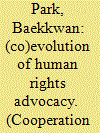

|
|
|
|
|
| Summary/Abstract |
How does the discussion of human rights issues change over time? Without advocates adopting a human rights issue in the first place, international ‘shaming’ cannot occur. In this article, we examine how human rights discussions converge and diverge around new frames and new issues over time. Human rights norms do not evolve alone; their prevalence, framing, and focus are all dependent on how they relate to other norms in the advocacy community. Drawing on over 30,000 documents from dozens of human rights organizations from 1990 to 2011, we provide a temporal overview and visualization of the ebb and flow of human rights issues. Using our new dataset and state-of-the-art methods from computer science, our approach allows us to quantitatively examine (a) how new issues emerge in the advocacy network, (b) the relationship of these new issues to extant human rights advocacy and information, and (c) how the framing and specificity of these issues change over time. By focusing on the process by which a new issue gets incorporated into the work of advocates, we provide an empirical assessment of the first step in the causal process connecting shaming to improvement in human rights practices.
|
|
|
|
|
|
|
|
|
|
|
|
|
|
|
|
| 2 |
ID:
167403
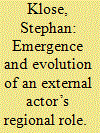

|
|
|
|
|
| Summary/Abstract |
The regional roles external actors play, such as ‘China’s role in Africa’ or ‘the US role in East Asia’, have long been popular subjects of analysis in the international relations literature. Yet, the emergence and evolution of these roles remains remarkably under-theorized. While some ‘new regionalist’ scholars have discussed the dynamics of an external actor’s regional involvement by referring to the concepts of ‘penetration’ and ‘socialization’, neither concept, this article argues, is sufficiently equipped to capture how external actors come to aspire and realize their regional roles. To address this shortcoming, the article employs an interactionist role theory perspective, which draws on the work of social psychologist George Herbert Mead. In following this perspective, the article argues that external actors develop regional role aspirations as they draw on their creativity and reflexivity to overcome experienced uncertainties. To realize these aspirations, the article suggests, external actors seek to cast significant others into corresponding roles. Alter-casting, the article argues in this context, is critical for understanding the (re)constitution of an external actor’s regional role, and thus a region’s social structure.
|
|
|
|
|
|
|
|
|
|
|
|
|
|
|
|
| 3 |
ID:
167402
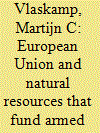

|
|
|
|
|
| Summary/Abstract |
Natural resources can be an important source of funding for warring parties in armed conflicts. Curbing the trade in these so-called conflict resources is, therefore, part of the European Union’s conflict management policies. The article explores the EU’s policies in this field and asks, specifically, why the EU is using supply chain due-diligence measures to achieve this goal. The author argues that they are the response to enforcement problems of most existing multilateral and unilateral sanction regimes because of state weakness in the targeted regions. This approach results from a broader idea from the EU that transparency can improve resource governance and, therefore, safeguard both its political and economic interests in conflict zones, such as the eastern Democratic Republic of the Congo. However, when the issue becomes specific—as in the EU Conflict Minerals Regulation—translating this idea into concrete policies becomes more contentious as the EU institutions set different priorities for the final policy design.
|
|
|
|
|
|
|
|
|
|
|
|
|
|
|
|
| 4 |
ID:
167399


|
|
|
|
|
| Summary/Abstract |
This article conducts a comparative analysis of peer and public pressure in peer reviews among states. Arguing that such pressure is one increasingly important form of shaming in global politics, we seek to understand the extent to which five different peer reviews exert peer and public pressure and how possible variation among them can be explained. Our findings are based on responses to an original survey and semi-structured interviews among participants in the reviews. We find that peer and public pressure exist to different degrees in the peer reviews under study. Such differences cannot be explained by the policy area under review or the international organization in which peer reviews are organized. Likewise, the expertise of the actors involved in a peer review or perceptions of the legitimacy of peer review as a monitoring instrument do not explain the variation. Instead, we find that institutional factors and the acceptance of peer and public pressure among the participants in a peer review offer the best explanations.
|
|
|
|
|
|
|
|
|
|
|
|
|
|
|
|
| 5 |
ID:
167400
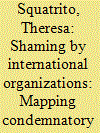

|
|
|
|
|
| Summary/Abstract |
In the face of escalating conflicts or atrocities, international organizations (IOs), alongside non-governmental organizations (NGOs), often vocalize public condemnation. Researchers have examined NGO shaming, but no extant literature has comparatively explored if, how and why IOs shame. This article fills this gap. We conceptualize IO shaming as condemnatory speech acts and distinguish between the agent, targets and actions of shaming. We theorize how compliance and socialization are motives that lead IOs to shame. Empirically, we use new data on more than 3000 instances of IO shaming, covering 27 organizations between 1980 and 2015 to examine empirical patterns across the three dimensions of agents, targets and actions. We find that the majority of IOs do employ shaming but to varying degrees. Global, general-purpose IOs shame the most and regional, task-specific IOs the least. IOs mainly shame states, but there is a rise in the targeting of non-state and unnamed actors. While many condemned acts relate to human rights and security issues, IOs shame actions across the policy spectrum. These findings indicate that IO shaming is driven by compliance and socialization motives and that it is a wider phenomenon than previously recognized, suggesting possible avenues for further inquiry.
|
|
|
|
|
|
|
|
|
|
|
|
|
|
|
|
| 6 |
ID:
167401
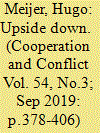

|
|
|
|
|
| Summary/Abstract |
Since the end of the Cold War, the study of European defence has been dominated by a ‘Common Security and Defence Policy (CSDP)-centric’ approach, while largely neglecting the comparative analysis of national defence policies. This article makes a conceptual and empirical case for turning the dominant research prism of European defence studies upside down by returning the analytical precedence to the national level. This approach privileges the comparative analysis of national defence policies and armed forces, before focusing on the trans-/supra-national level. The case for this analytical turn is made in three steps. Firstly, it addresses the different historical stages in European defence integration and the transformation of national armed forces and thereby brings to light the recent renationalization of defence in Europe. Secondly, it questions the predominance of the CSDP in the scholarly literature on European defence. Finally, it seeks to demonstrate the fruitfulness of such a démarche by empirically substantiating common patterns and intra-European divergences in the evolution of national defence policies and armed forces since the end of the Cold War. After having shown the need and added benefit of turning the analytical lense of European defence studies on its head, the conclusion suggests future avenues of research on national defence policies and armed forces in Europe.
|
|
|
|
|
|
|
|
|
|
|
|
|
|
|
|
|
|
|
|
|